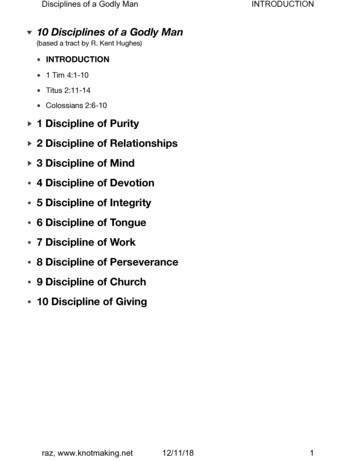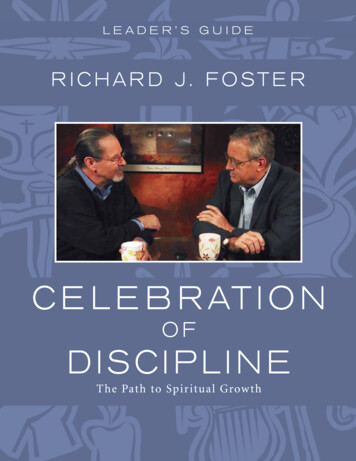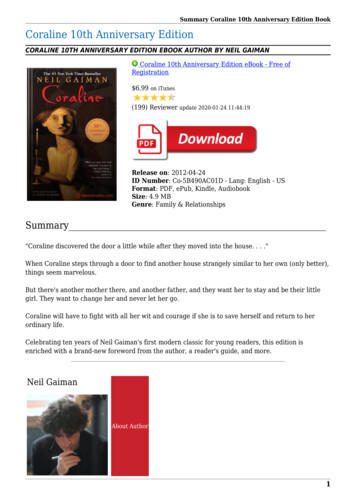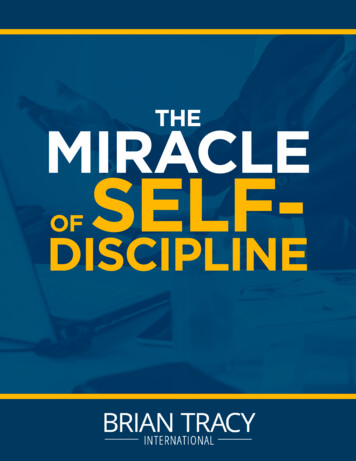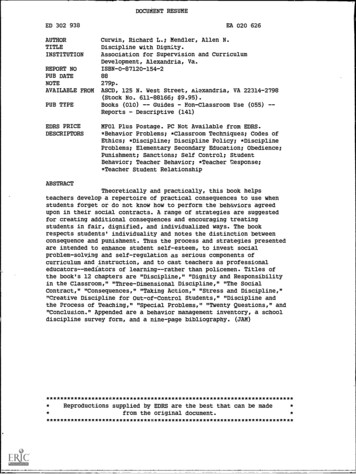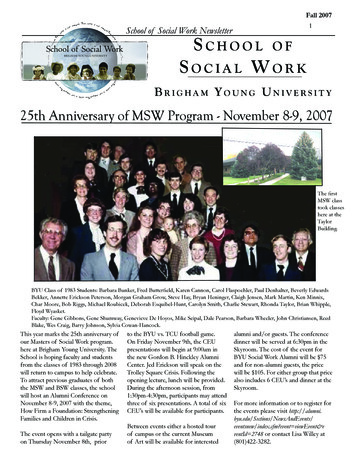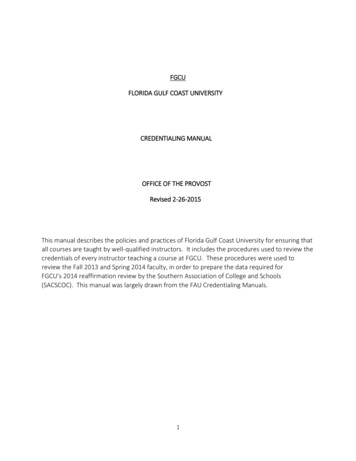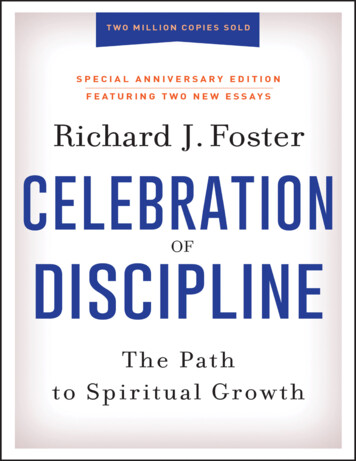
Transcription
DedicationTo Carolynnwife, counselor, companion, encourager
ContentsCoverTitle PageDedicationForeword to the Special Anniversary EditionPreface to the Special Anniversary Edition: A Beginning WordIntroduction to the 20th Anniversary Edition1: The Spiritual Disciplines: Door to LiberationPart I: The Inward Disciplines2: Meditation3: Prayer4: Fasting5: StudyPart II: The Outward Disciplines6: Simplicity7: Solitude8: Submission9: ServicePart III: The Corporate Disciplines10: Confession11: Worship12: Guidance13: Celebration
AcknowledgmentsThe Great Conversation: An Annotated BibliographyIn Celebration of Celebration of DisciplineNotesScripture IndexSubject IndexAbout the AuthorAlso by Richard J. FosterCopyrightAbout the Publisher
Foreword to the Special Anniversary EditionIf you are anything like me, you genuinely long for abilities that are beyondyourself in order to face the demands of everyday life patiently and wisely.You—I—we—would love to have the inner resources to replace deep,destructive habits of thought with even deeper, life-giving habits of mindand heart and spirit. In our best moments (we do have other moments), weseek the ability to overcome guile and manipulation. We genuinely want tobe free of all anger and bitterness and strife. We desire to possess theunadulterated goodness that will enable us to defeat evil whenever andwherever it appears. We long for the deep character formation that can freeus from all boasting and arrogance, all narcissism and conceit.We seek fulfillment in serving others. We yearn for the inner courage toforgive others, even our enemies—especially our enemies. We long for aspirit of repentance and the strength to live a transformed life. We hungerfor an ongoing, life-giving, interactive relationship with Jesus. We want tobe characterized through and through with the joy of the Lord. And we seekafter all of these things not as some outward show but as the deeptransformation of the inner person.If in some measure these longings reflect the hopes and dreams andaspirations of your heart, then I have wonderful news for you. Throughoutthe ages, Christians of all races and ethnicities from all geographic locationsand economic backgrounds have witnessed that the classical Disciplines ofthe spiritual life can produce deep within us exactly this kind of life. TheSpiritual Disciplines are the means of God’s grace for bringing aboutgenuine personality formation characterized through and through by loveand joy and peace and patience and kindness and goodness and faithfulnessand gentleness and self-control (Gal. 5:22–23).Now, we might want to sit for a moment with the thought that we havethis unique capacity for moral development. I mean substantial character
formation and transformation. Think of it. God could have created thehuman species into granite boulders or red radishes—merely minerals andvegetables. But instead God has given us the capacity for developing moralcharacter, the ability to become glorious beings that can live in communionwith the Triune Reality of Father, Son, and Holy Spirit for eternity.This is a great risk on God’s part. The moral development of personalityis possible only in a world of genuine freedom. And for us to have thefreedom to grow in moral character also means we have the freedom tochoose moral evil . . . at times horrendous moral evil. So, for us to developand grow in moral character is God’s great project for human beings. Thisis the gamble God has made with the human enterprise. And what God getsout of this gamble is the kind of person we become.So, how does the moral transformation of mind and heart and souloccur? What are God’s ways for this to happen in your life and in my life?The Spiritual Disciplines are God’s means of grace by which we areenabled to bring our little, individualized power pack we call the humanbody and place it before God as a “living sacrifice,” as the wise apostle Paulput it (Rom. 12:1). Having done this, the Disciplines have reached the endof their tether. God then steps into our small offering and produces in usgraces and virtues we could hardly imagine. Again, the Spiritual Disciplinesare the means God uses to build in us an inner person that is characterizedby peace and joy and freedom.It is critical for us to understand that the Spiritual Disciplines possess nomoral rectitude or righteousness in and of themselves. They are, mostdefinitely, not “works righteousness,” as it is sometimes said. They place us—body, mind, and spirit—before God. That is all. The results of thisprocess are all of God, all of grace.Now, the opposite of grace is “works.” Works has to do with earning,and there simply is nothing we can ever do to earn God’s approval. OrGod’s love.Again, the opposite of grace is works—but not effort. As Jesus taughtus, we are to strive to “enter by the narrow gate” (Matt. 7:13). We do indeedengage in practices—disciplines, if you will—but remember these practicesearn us nothing in the economy of God. Nothing. Their only purpose is toplace us before God. That is all. (And even these actions are themselvesinspired by the prevenient grace of God.) God then steps into our actions
and, over time and experience, produces in us the formation of heart andmind and soul for which we long. Again, the results are all of grace.This is why the apostle Peter in his small epistle could urge us to “growin the grace and knowledge of our Lord and Savior Jesus Christ” (2 Pet.3:18). You see, our normal way of thinking about grace is as “unmeritedfavor.” And, to be sure, grace is most certainly unmerited favor—but it is somuch more than this! Simply put, we are not able to “grow” in unmeritedfavor. Now, with the Spiritual Disciplines, the form that God’s grace takesis interactive relationship. God invites us into a variety of SpiritualDisciplines, and we step into them as best we can. These actions place usbefore God as a living sacrifice. God, in turn, uses our actions to buildwithin us deeply ingrained habit patterns of “righteous and peace and joy inthe Holy Spirit” (Rom. 14:17). Back and forth, back and forth, in interactiverelationship so that, through time and experience, we are learning to “growin grace.”Once more, the Spiritual Disciplines are the means God uses forproducing in us the needed transformation of heart and mind and soul.Remember, God is working, always working, to form us and conform usand transform us into the image of Christ. God is intent upon this forming,conforming, transforming process. And God invites us to participate in thisprocess by means of interactive relationship.Now, this deep character formation in the subterranean chambers of ourhearts does not occur overnight. This is no quick fix. It is crucial here for usto respect the slow work of God upon the soul. Slowly, ever so slowly, overdays and weeks and months and years, the soul is being carefully formedand conformed and transformed. Throughout this holy work we are learningpatience, stillness, perseverance, “time-fullness.”Of course, throughout this liberating process we are carrying on thedaily tasks of home and work. Indeed, these places comprise the centralarena where the work of formation occurs.Now, I do not have any exhaustive list of the Spiritual Disciplines. Asfar as I know, none exists. All we are learning to do is undertake practicesof heart and mind and soul that place us before God. Some practices may beformal and intently liturgical. Others may be spontaneous and free flowing.The actual practices of the Disciplines are as varied and as creative ashuman personality itself.
But, and here is the key, the Spiritual Disciplines are actions of bodyand heart and mind and soul that we actually do. Not just admire. Not juststudy. Not just debate. But practice.As I said, our practices can have enormous variety. One thing, however,will always be central to our exercise of the Spiritual Disciplines—HolyScripture. Reading Scripture. Studying Scripture. Meditating uponScripture. Memorizing Scripture.If we truly desire to be like Jesus, then we will want to take up theoverall way of life Jesus himself lived when he was among us in the flesh.The Gospels of Matthew, Mark, Luke, and John give us this picture invibrant, living Reality! We learn from the Gospels that Jesus undertookSpiritual Disciplines as a fixed pattern of his life. So should we. And, as wegive attention to the whole trajectory of Scripture, we quickly discover thatall the great ones in the Bible exercised a large variety of SpiritualDisciplines themselves. Surely this is an incentive for us to follow the leadof our leaders.Two distinct movements mark the Spiritual Disciplines: the via negativaand the via positiva. The via negativa focuses on ascetical Disciplines likemeditation, fasting, simplicity, solitude, submission, and confession. Theseteach us life-giving ways of self-denial and letting go. The via positivafocuses on incarnational Disciplines like prayer, study, service, worship,guidance, and celebration. These teach us life-giving ways of growth andaffirmation. Together these two movements are aimed at freeing us fromsoul-crushing patterns of death and creating joy-filled patterns of life. Take,for example, the Discipline of fasting, which focuses on disciplining ourdesires (the via negativa) and so creating deep within us a spirit that isstrong and sweet when we don’t get what we want (the via positiva).One more thing: this way of living is not confined to people in religiousorders or those who have special skills in spiritual matters. No, this life isalso for ordinary people. People who work in the high-pressure jobs ofinformation technology and finance. People who are constantly dealingwith the stresses of raising children and balancing the family budget. Peoplewho teach school and work in hospitals and provide social services and somuch more. In short, people just like you and me.Now, this interior focus on the growth of the soul does have itsdetractors. After all, a thousand tragedies cry out for our responses. Sorrowsabound. Human agonies multiply. So those on the outside can easily see
time and attention to the Spiritual Disciplines and the life they produce aspious selfishness. Their concern is that by focusing on inward matters, wewill neglect outward needs.Such concern, however, fails to understand the full thrust of theSpiritual Disciplines themselves. Deeply embedded in their exercise is theimpulse toward what the old writers called “social righteousness.” You see,white-hot love of God of necessity drives us into compassionate love ofneighbor. We only need to consider a person like Mother Teresa of Calcuttato see how love of God drives us to love of neighbor. In her context, thismeant devoting her life to “the poorest of the poor.” For us, we cannotpredict beyond the firm conviction that any genuine immersion in theSpiritual Disciplines will lead us to our neighbor, the person who is near tous. True godliness does not turn us away from hurting, bleeding humanity.Rather it enables us to live fully alive in the midst of human need andenlivens our abilities to bring a healing presence to the bruised and brokenaround us.I’m sure you understand that these efforts are best done in the context ofcommunity life. These are not solo efforts. We need each other. We dependupon each other. We learn together. We suffer together. We weep together.We pray together. We laugh together.Richard J. Foster
Preface to the Special Anniversary Edition: ABeginning WordForty years ago there was an abysmal ignorance of how we grow in grace,entering into ever fuller and deeper Christlikeness. I penned Celebration ofDiscipline in response to this crying need.The response was a genuine surprise. And overwhelming. The hungerfor real, transforming power was greater that I ever could have imagined.Once people realized that progress in character formation is actuallypossible, they were seized with genuine hope and encouragement. Storiespoured in; heartrending stories, hope-filled stories, stories of love and faithand fierce struggle.Not everything was rosy. Many, many dear people, catching this visionof a with-God kind of life, felt isolated and orphaned even in quite goodchurches. Others lacked substantive teaching that could take them deeper.And the culture in general was so captivated by fads that it undermined thestaying power of many . . . folks were quickly on to the next “best” thing.Still, today, some forty years later, we can thank God for steps forward.Many no longer find “spiritual discipline” to be negative and off-putting.Vast numbers of ordinary folk have taken into their own lives Disciplines ofthe spiritual life that reflect the overall life of Jesus himself. And, they haveindeed discovered these Spiritual Disciplines to be the means of God’sgrace for the formation and transformation of heart and mind and spirit andbody and soul. They have actually made progress forward in the spirituallife. What a wonder! What a grace! I thank God.Now, let’s consider together whether Celebration of Discipline isrelevant to our cultural context today. So much has changed in the last fourdecades. Perhaps most important is the explosion of informationtechnologies in our day. Back when I wrote Celebration, the internet wasbarely on the horizon and certainly still in the future for the average person.
“Cookies” were for eating. “Having a virus” meant we were sick. Hackerswere unheard of. But now, with the invention of the microchip, we havepersonal computers we can hold in our hands or strap to our wrists.Emailing, texting, tweeting, and much more have transformed moderncommunications.Indeed, the explosion of information technologies that we are nowexperiencing is not unlike the explosion of information and the rapiddissemination of ideas produced by Gutenberg and his movable type in thefifteenth century. Today, however, the changes seem to be crashing in on uswith lightning speed.Nevertheless, and this is the crucial point, nothing in these amazingtechnologies touches the substance of the human personality. Our moraldeficiencies are as glaring as ever . . . perhaps even more so, as aconsuming pride grows stronger with every advance we make. Deep insidewe still long for freedom from anger and bitterness and hostility. None ofour gadgets are able to overcome the deep, destructive habit structures thatreside in our souls. No technology is able to produce the charactertransformation we so desperately need. The gnawing hunger for thespiritual realities of love and joy and peace remains.Our world, you see, has not changed all that much. The message ofCelebration of Discipline is as relevant as ever. The needs are as great asever. Divine resources are as available as ever.There is one major difference that has occurred in the past forty yearsthat does indeed impinge upon the spiritual life. I can state it in one word:distraction. Distraction is the primary spiritual problem in contemporaryculture. Frankly, when we are perpetually distracted, we are unable todiscern the Kol Yahweh, the voice of the Lord.Oh, for the day when all we had to do was turn off the television if wewanted solitude and silence! Now, we click through an endless stream ofinternet links, write daily blogs, read tweets from God knows who, checkour emails constantly, text family and others, and mindlessly scroll throughFacebook.Even more insidious are the ways we are bombarded by the broaddistractions of constant noise, constant demands, constant news. Everyone,it seems, wants us to be accessible 24/7 and to respond instantly to any andevery request. If we delay answering an email for even an hour or twopeople are worried that something is wrong with us. Neuroscience studies
are now showing us that the neural pathways of our brains are beingrewired accordingly, so that our physical capacity for sustained attention isdecreasing.We, of course, complain endlessly about our wired world. But—let’s behonest—we do enjoy our technological gluttony.There is, however, a better way to live. For all who are longing for anew start, allow me to provide you with a spiritual exercise (the SpiritualDisciplines can come in many forms) that can begin to free you from thecrippling grip of multiple distractions. It comes in a little three-part rhythm:Day One: For thirty minutes, turn off all technology . . . yoursmartphone does have an off button. Make a good strong cup of coffee ortea. Find a good place to sit. Begin by speaking aloud these words of thePsalmist: “Search me, O God, and know my heart! Try me and know mythoughts! And see if there be any wicked way in me, and lead me in theway everlasting!” (139:23–24). Then, be still. No writing. No talking.Nothing. The objective here is to clear away all “creaturely activity,” to usea phrase from the old writers.Day Two: Again, for thirty minutes, become free of all technology.Today, take a walk, allowing your footsteps to fall into the rhythm of yourwhispering of the Jesus Prayer: “Lord Jesus Christ, Son of God, have mercyon me, a sinner.”Day Three: Again, all technology is off for thirty minutes. A good cupof coffee or tea and a comfortable chair are in order. Begin with the simpleprayer I composed for coffee time: “O Spirit of God, blow across my littlelife and let me drink in your great Life. Amen.” Next, ever so slowly, praythe words of the Lord’s Prayer (Matt. 6:9–13). With each phrase of theprayer add your own thoughts or concerns a little like you are decorating aChristmas tree with your own ornaments. See if your extended prayerfulmeditation will bring you to the end of the Lord’s Prayer at about the thirtyminute mark.Days Four, Five, and Six: Repeat the same rhythm of days one, two,and three.Day Seven: Use your technology to your heart’s content.Follow this three-part rhythm for several months, maybe a year. Aftersome practice, you may want to extend your time to one hour rather thanthirty minutes. Then, when you feel you are ready, you can take the nextstep: a twenty-four-hour retreat with no technology whatever. No radio. No
smartphone. No laptop. No iPad. No MP3 player. Take a print Bible forreading and a pen and pad for writing—no more than that. See whathappens. Who knows, you just may be enabled to “listen to God’s speech inhis wondrous, terrible, gentle, loving, all-embracing silence,” to use themoving words of Catherine de Hueck Doherty. I recommend that youconsider using this twenty-four-hour retreat pattern four times a year:winter, spring, summer, and fall.These, of course, are beginning steps. You can add to them and extendthem and modify them as your desires and needs call for it. Be encouragedby the teaching of Thomas Aquinas that “habit overcomes habit.” Andremember that Jesus Christ, your living Teacher, will guide you.What I have written here, as you can tell, is provided specifically for thefortieth anniversary of Celebration of Discipline. I rather imagine it willpass with the next edition. However, the foreword that is to follow will, Ihope, become an evergreen piece in the Celebration canon.
Introduction to the 20th Anniversary EditionIt is a wonder to me how God uses squiggles on paper to do his work in thehearts and minds of people. How are these squiggles transformed intoletters and words and sentences and, finally, meaning? Oh, we maycongratulate ourselves on knowing a little about the function ofneurotransmitters in the brain or about how endorphin proteins affectlearning and memory retention, but if we are honest, we know that thinkingitself is a mystery. Doxology is the only appropriate response.At this writing, it has been two decades since this particular set ofsquiggles, Celebration of Discipline, was first published. After the firstdecade, the publisher, no doubt puzzled by its longevity and popularity,wanted to celebrate this milestone, and asked me to revise the original text—which I was glad to do. And now, after a second decade, the puzzlecontinues. Somehow (who can ever explain how?) people continue to findhelp in their daily walk with God through the pages of this book. Tocelebrate this twentieth anniversary, the publisher has asked me to write anintroduction, and, again, I am glad to comply. And perhaps in fulfilling theirrequest it is appropriate to tell how the book you hold in your hands cameinto being.Spiritual BankruptcyFresh out of seminary, I was ready to conquer the world. My firstappointment was a small church in a thriving region of Southern California.“Here,” I mused, “is my chance to show the denominational leadership, nay,the whole world, what I can do.” Believe me, visions of far more than sugarplums were dancing in my head. I was sobered a bit when the former pastor,upon learning of my appointment, put his arm on my shoulder and said,“Well, Foster, it’s your turn to be in the desert!” But the “sobering” lasted
only a moment. “This church will become a shining light set on a hill. Thepeople will literally flood in.” This I thought, and this I believed.After three months or so I had given that tiny congregation everything Iknew, and then some, and it had done them no good. I had nothing left togive. I was spiritually bankrupt and I knew it. So much for a “shining lighton a hill.”My problem was more than having something to say from Sunday toSunday. My problem was that what I did say had no power to help people. Ihad no substance, no depth. The people were starving for a word from God,and I had nothing to give them. Nothing.Three Converging InfluencesIn the wisdom of God, however, three influences were converging inthat little church that would change the direction of my ministry, indeed, ofmy whole life. Together they would provide the depth and the substance Ineeded personally and the depth and the substance that, in time, would leadto the penning of Celebration. But that is running ahead of my story.The first thing to happen was precipitated by an influx of genuinelyneedy people into our small congregation. They simply flowed in likestreams after a thunderstorm. Oh, how they hungered for spiritual substanceand, oh, how willing they were to do almost anything to find it. These werethe castoffs of today’s fast-track culture—“the sat upon, spat upon, rattedon”—and so their neediness was quite obvious. Just as obvious was myinability to give them substantive pastoral care.This lack of any real spiritual density led me, almost instinctively, to theDevotional Masters of the Christian faith—Augustine of Hippo and Francisof Assisi and Julian of Norwich and so many others. Somehow I sensed thatthese ancient writers lived and breathed the spiritual substance these newfriends in our little fellowship were seeking so desperately.To be sure, I had encountered many of these writers in academicsettings. But that was a detached, cerebral kind of reading. Now I read withdifferent eyes, for daily I was working with heartbreaking, soul-crushing,gut-wrenching human need. These “saints,” as we sometimes call them,knew God in a way that I clearly did not. They experienced Jesus as thedefining reality of their lives. They possessed a flaming vision of God that
blinded them to all competing loyalties. They experienced life built on theRock.It hardly mattered who I read in those days—Brother Lawrence’s ThePractice of the Presence of God, Teresa of Ávila’s Interior Castle, JohnWoolman’s Journal, A. W. Tozer’s The Knowledge of the Holy—they knewGod in ways far beyond anything I had ever experienced. Or even wantedto experience! But as I continued to soak in the stories of these women andmen who were aflame with the fire of divine love, I began desiring this kindof life for myself. And desiring led to seeking and seeking led to finding.And what I found settled me, deepened me, thickened me.The second influence came from an individual in that tiny congregation,Dr. Dallas Willard. A philosopher by profession, Dallas was well versed inthe classics, and, at the same time, had an uncanny perception into thecontemporary scene. He taught our fledgling little group: studies in Romansand Acts and the Sermon on the Mount and the Spiritual Disciplines andmore. But regardless of the specific topic, he constantly drew us into the bigpicture. It was life-based teaching that always respected the classicalsources and always sought to give them contemporary expression. Thoseteachings gave me the Weltanschauung, the worldview, upon which I couldsynthesize all my academic and biblical training.But it wasn’t just the teaching, or at least it wasn’t teaching as weusually think of teaching. It was a heart-to-heart communication that wenton between this world-class philosopher and that little ragtag band ofChrist’s disciples. Dallas taught us right in the midst of our struggles, ourhurts, our fears. He had descended with the mind into the heart and taughtout of that deep center.Today, many years later, I still revel in the impact of thoseteaching/living/praying sessions. It was, of course, teaching-in-community.We were in each other’s homes—laughing together, weeping together,learning together, praying together. Some of the best teaching times grewout of the dynamic of those home settings where we might go late into thenight—posing questions, debating issues, applying gospel truth to life’scircumstances. Dallas would move among us, teaching, always teaching. Aspiritual charisma of teaching, I think. Teaching with wisdom. Teachingwith passion. Teaching with heart. And always we experienced a sense ofthe numinous.
The third influence came initially from a Lutheran pastor, WilliamLuther Vaswig. (With a name like “William Luther Vaswig” how could hepastor anything but a Lutheran church?) Bill’s church, large and influential,overshadowed our tiny Quaker fellowship. But what drew me to Bill hadnothing to do with “large” or “influential” or even “Lutheran.” No, what Isaw was someone thirsting for the things of God. So I sought him out.“Bill,” I said, “you know more about prayer than I do. Would you teach meeverything you know?”Now, the way Bill taught me about prayer was by praying. Lively,honest, heartfelt, soul-searching, hilarious praying. As we did this, overtime we began experiencing that “sweet sinking into Deity” MadameGuyon speaks of. It, very honestly, had much the same feel and smell as theexperiences I had been reading about in the Devotional Masters.This movement into prayer was actually a two-pronged influence. Mypraying experiences with Bill were augmented by those of a wonderfullydetermined woman, Beth Shapiro, who was the head of the elders for ourlittle fellowship. Beth was a nurse at a large hospital, and after working thenight shift, she would come over to our church building in the earlymorning and we (Beth and I) would spend an hour or two praying forpeople. All kinds of people. People in our fellowship and people outside ourfellowship. Whomever and whatever, Beth would want to pray for them.Then we would often discuss issues of theology, of faith, of life. Andwhatever we talked about Beth tested out at the hospital. If we discussed theBible’s teaching on “the laying on of hands,” at work Beth would put herhands into the rubber gloves of an incubator and place them on a prematureinfant, praying silently and lovingly, and watch that little one increase inhealth and well-being. These were the kinds of things Beth would do, notjust now and again, but repeatedly. Through Beth I learned the necessity ofbringing spiritual realities into the press of raw humanity.Now, these three influences converged in those days of my youngpastoring, and the result was a quiet revolution, inside and out. And in ourfellowship of needy seekers we were experimenting with everything wewere learning. Those were heady days, for we sensed we were on tosomething of enormous significance. We were hammering out on the hardanvil of daily life all that appeared years later in Celebration of Discipline.But these influences by themselves did not move me into actual writing.More was needed.
Three Empowering CatalystsThis “more” came in the form of three separate and quite differentcatalysts. The first came by the hand of Bill Cathers, a former missionaryand a man of unusual discernment and wisdom. It happened in this way.Growing out of three days of fasting and praying, I felt a concern to callBill and invite him to pray for me. That was the extent of my guidance, onlythat he pray for me; I had not the slightest idea what he should pray or evenwhy. He agreed to come.When Bill arrived, the very first thing he did was to begin confessinghis sins to me. I sat there astonished. “What is he doing? He’s the spiritualsage.” These were my inner thoughts, but I waited in silence. Finally, hefinished, and I spoke over him those liberating words of 1 John 1:9, “If weconfess our sins, he who is faithful and just will forgive us our sins andcleanse us from all unrighteousness.”Then Bill, looking right at me—and right through me—asked ever soquietly, “Now, do you still want me to pray for you?” He had seen into myheart! He knew that I had put him high on a pedestal as some spiritual guru,and he was pulling all that down into a crumpled heap. Sobered by hisdiscernment, I replied simply, “Yes, I do.”He then laid his hands on me and prayed one of the deepest prayers Ihave ever received. The power of that prayer is still with me today. I cannotbegin to convey to you the height and the depth, the length and the breadthof his prayer, but I will tell you one word he spoke—a power-filled word, aprophetic word. “I pray,” he said, “for the hands of a writer.”There it was. I had longed to write for years. But I had never told aliving soul about this secret desiring. I was too shy to tell anyone. On thatday I felt empowered for the ministry of writing, and while Celebration laysome years in the future, I did begin the necessary apprenticeship by writingnumerous magazine article
guidance, and celebration. These teach us life-giving ways of growth and affirmation. Together these two movements are aimed at freeing us from soul-crushing patterns of death and creating joy-filled patterns of life. Take, for example, the Discipli
